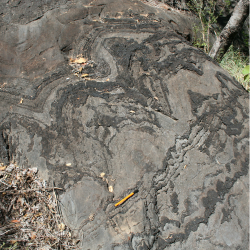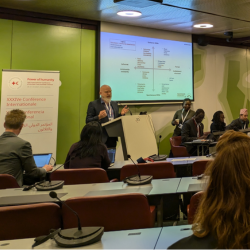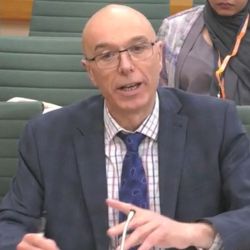was a series of four workshops organised by the Centre for Global Development in June 2021, with the key support of the UK Development Studies Association (DSA). The series interrogated how coloniality, understood here as referring to “long-standing patterns of power that emerged as a result of colonialism, but that define culture, labour, intersubjective relations, and knowledge production well beyond the strict limits of colonial administrations” (), is embedded within development research and practice and how global development can be a driver of contemporary global, racialised inequalities.
The workshop series was aimed at students, early-career researchers (ECRs) and development practitioners, recognising the fluid intersections that exist between development research and practice. The workshops have brought a decolonial approach to development into conversation with concerns about contemporary work, speaking to the challenges of approaching development studies through a decolonial lens as an increasingly precarious (and for some of us racialised) workforce within the neoliberal university. These trends are not restricted to the UK but are a feature of higher education and development practice more globally.
There is much discussion about how terms such as decolonial are mobilised (). We have used this as an opportunity to explore the historical and contemporary structures that reinforce coloniality within development studies, but also as an opportunity to start to think where we can act within the everyday interactions of doing development.
Recognising the fluidity, transitions and partnerships between development scholars and practitioners, this workshop series, whilst focused on research processes, will be relevant to those working in development practice. Greater engagement with (de)coloniality is an area of concern for those across the development community. The project-based nature of the workshop series, and the diverse backgrounds of the speakers from NGOs and universities in different parts of the world, encourages us to consider how coloniality is embedded in development studies and practice.
The aims of the workshop series were:
- To explore how coloniality is manifested in development research and practice and how this can be decentred.
- To learn about development knowledge that is traditionally marginalised through the dominance of ‘Western’ knowledge.
- To think about how we can destabilise modes of research that perpetuate dominant forms of knowledge production, for example methodologies and dissemination practices.
- To consider as ECRs and practitioners, with challenges of precarity and influence, how we can contribute to the co-creation of a development field that challenges patterns of coloniality.
- To start to develop a network of ECRs and practitioners with an interest in decoloniality and development.
The Decolonial Chats series comprised four workshops:
- . Speakers: Juana Francis Bone (NGO Mujeres de Asfalto) and Dr Sofia Zaragocin (Universidad de San Francisco de Quito). Moderator: Dr Inge Boudewijn (Northumbria University). June 2, 2021.
- . Speaker: Dr Moses Okech (Uganda Martyrs University). Moderator: Dr Sarah Peck (Northumbria University). June 9, 2021.
- . Speaker: Dr Nnimmo Bassey (NGO Health of Mother Earth Foundation; NGO Environmental Rights Action - Friends of the Earth Nigeria). Moderator: Benita Siloko (Northumbria University). June 17, 2021.
- Speakers: Roberto Gomes dos Santos (Coordination of the Popular Movements Central of Rio de Janeiro, Brazil) and Dr Rolf Malungo de Souza (Universidade Federal Fluminense). Moderator: Bianca Fadel (Northumbria University). June 24, 2021.
During each workshop, the presentation of speakers was recorded and followed by an inviting space for questions & answers and also smaller group discussions (not recorded) to facilitate connections and deeper debates among participants and with the speakers.
You can find out more about the series and access all the recordings of the four workshops by visiting the .
The final report is also in English, Portuguese and Spanish. In case of any questions, please contact Dr Sarah Peck.
Projects
- DignArte Cimarrona: Tackling Racialised Gender-Based Violence
- State of the World's Volunteerism Report
- Transforming Volunteering in Development
- Sajag-Nepal
- Small-scale Private Development Initiatives
- Volunteering at Habitat
- Volunteering in the Indian Sundarbans
- Blackness in Resistance
- Four Women
- Diasporic communities and the climate crisis
- Towards Unlearning Colonialism in Development Research and Practice
- Reference Guide on Volunteering
- Poetics of Diplomacy
- RECLAMA
- Asia-Pacific ClimateScapes
- Wildlife Trade Futures
- VSO Blended Volunteering
- Diaspora groups, civil society and development
- IFRC Volunteering Policy Study
- Refugee Youth Volunteering Uganda (RYVU)
- Living Deltas
- ViCE
- Women and photography
- REMATCH
- Proactively Living with Floods
- Global Review on Volunteering
Latest News and Features

Satellites observe glacier committing 鈥渋ce piracy鈥�
A glacier in Antarctica is committing 鈥渋ce piracy鈥� 鈥� stealing ice from a neighbour 鈥� in a phenomenon…

Read the latest issue of Northumbria University News: Spring 2025 edition
The Spring 2025 edition of Northumbria University鈥檚 newspaper is available to collect on campus…

Research provides new detail on the impact of volcanic activity on early marine life
Analysis of fossilised rocks known as stromatolites from more than two-and-a-half billion years…

Northumbria and IFRC strengthen collaboration to advance research on volunteering
Volunteers play critical roles in responding to the multiple humanitarian crises facing the…
EXPERT COMMENT: DeepSeek claims to have cured AI鈥檚 environmental headache. The Jevons paradox suggests it might make things worse
In this article originally written for The Conversation*, from Northumbria University, Assistant…

Lecture series inspired by the past supports bicentenary celebrations
Researchers from Northumbria University are helping to celebrate 200 years since the opening…

National planning reforms shaped by Northumbria expert
A leading expert in planning policy at Northumbria University has delivered evidence to help…

Can energy saving improvements make your home less healthy?
A team of researchers are set to investigate the impact of retrofitting houses to make them…

